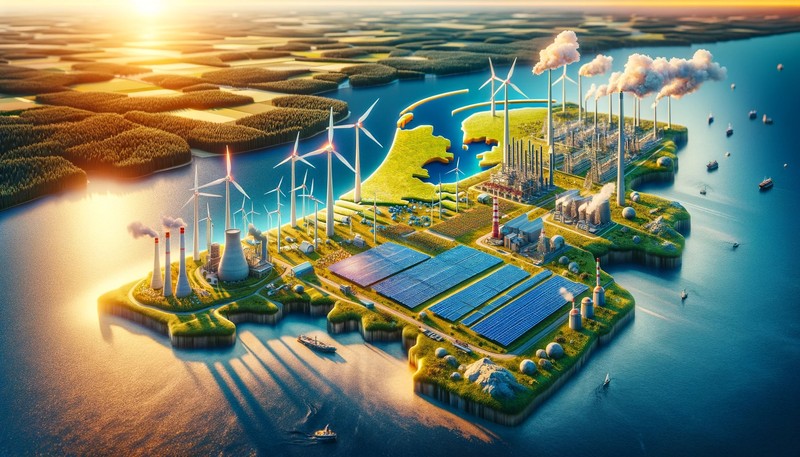Electricity market in the Netherlands
Main sources of energy
The Netherlands primarily relies on natural gas, wind energy, and biomass for its electricity generation. Natural gas stands out as the predominant source, contributing significantly to the country's energy mix. This reliance is due to the extensive natural gas reserves found in the country, particularly in the Groningen field, one of the largest gas fields in the world.

Recently, there has been a notable shift towards renewable energy sources, especially wind energy. The Dutch government has invested in offshore wind farms, which have increasingly contributed to the national electricity grid. Biomass also plays a role, although it's less significant compared to natural gas and wind energy.
Integration with the EU electricity market
The Netherlands is an active participant in the European Union's integrated electricity market. This interconnected system allows for the exchange of electricity across borders, enhancing energy security and market efficiency. The Dutch electricity grid is well-connected with neighboring countries, including Germany, Belgium, and the United Kingdom, through a network of cross-border interconnectors.
This integration facilitates not only the import and export of electricity but also contributes to the stabilization of electricity prices and the optimization of renewable energy usage. By being part of this larger network, the Netherlands can balance supply and demand more effectively, ensuring a more reliable and sustainable electricity supply.
Renewable energy initiatives
In recent years, the Dutch government has implemented policies to increase the share of renewable energy in the overall energy mix. These initiatives include subsidies for renewable energy projects and investments in new technologies. The goal is to reduce reliance on fossil fuels and decrease greenhouse gas emissions.
Wind power, particularly offshore wind farms, has seen significant growth. These farms are strategically placed in the North Sea, taking advantage of the region's strong wind resources. Solar energy is also gaining momentum, with both residential and commercial sectors increasingly adopting solar panels.
Challenges and future direction
Despite these efforts, the Netherlands faces challenges in its transition to a more sustainable energy system. The phasing out of the Groningen gas field due to seismic risks poses a significant challenge, necessitating a faster shift to alternative energy sources. Additionally, balancing the intermittent nature of renewable energy sources like wind and solar power remains a concern.
Looking ahead, the Dutch government is focusing on increasing energy efficiency, further developing renewable energy sources, and exploring new technologies like hydrogen fuel. The goal is to achieve a more sustainable, reliable, and affordable energy system that can meet the country's long-term energy needs while contributing to global environmental goals.
Impact on consumers and industries
The transition to a more sustainable energy mix has implications for both consumers and industries in the Netherlands. Consumers have seen changes in energy pricing and availability of green energy options. There is an increased emphasis on energy conservation and efficiency in households.
Industries, particularly those with high energy demands, are adapting to changes in energy supply and pricing. Some industries are investing in renewable energy projects, while others are exploring energy efficiency measures to reduce their environmental impact and operational costs. The Dutch government supports these transitions through various policies and incentives, aimed at creating a more sustainable and economically viable energy landscape.
